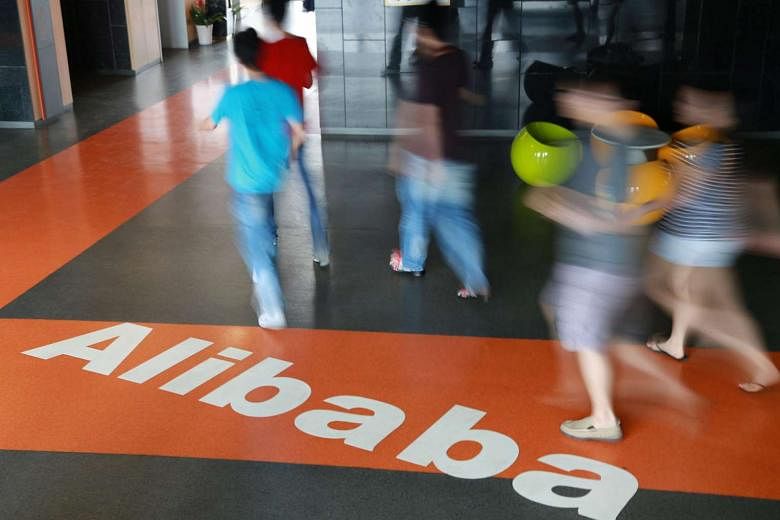BEIJING • Alibaba Group Holding is not shy about taking on global giants in everything from cloud computing to video streaming. Now, it is shifting its take-no-prisoners approach to everything from soap to toothpaste.
The company that trounced eBay in China has identified fast-moving consumer goods (FMCG) - think cereal, TV dinners or detergent - as pivotal to its drive to expand its services in the countryside.
Chief financial officer Maggie Wu vowed to outspend competitors by the billion when it comes to pushing the essential products that people use every day. That poses a direct challenge to JD.com, which specialises in selling electronics but is now also targeting demand for household items.
"We are pretty sure that we are going to invest further because we have that luxury," Ms Wu told analysts on a post-earnings conference call. "While the other company is talking about investing a billion dollars, we are willing to invest multiple times of that number."
Ms Wu threw down the gauntlet minutes after China's largest online bazaar reported its fastest pace of top-line growth since it went public in 2014, a performance that sent its shares to a 14-month high in New York. Alibaba singled out the so-called FMCG category, which saw a 67 per cent surge in business in the June quarter.
But CEO Daniel Zhang was "most pleasantly surprised" by a tripling in purchases from Tmall Supermarket, which carries brands such as Nestle's Perrier and Kellogg's.
-
Alibaba milestones
-
COMPANY RESULTS
•Sales rose 59 per cent in the first quarter to US$4.8 billion (S$6.5 billion)
•Operating profit rose 71 per cent to US$1.3 billion
•Advertising dollars up 54 per cent year on year
WINNING MOVES
•Turnover from mobile adverts surpassed that from PCs. Each customer launches its Taobao shopping app an average seven times a day
•US$4.6 billion investment in Suning Commerce Group gave access to 1,600 storefronts and warehouses in 290 Chinese cities
•US$1 billion investment in e-commerce firm Lazada opened window to six major markets in South-east Asia.
FUTURE PLANS
•Forge alliances to get popular items like cereals, detergents and appliances to villages out of reach of traditional retailers
•Outspend competitors by the billion to push everyday products to the countryside, thus posing threat to rivals like JD.com
•Have half the company's revenue to come from outside China within a decade
DRAWBACKS
•Food delivery business Koubei continues to burn cash competing with rivals
•Faces domestic challenge from likes of Baidu in cloud- computing sector in China
•Slowing growth in China may eventually hurt Alibaba's sales
SOURCE: REUTERS, BLOOMBERG, NEW YORK TIMES
Their comments reflect Alibaba's broader search for growth as its scale expands and traditional markets become saturated. Chairman Jack Ma is looking beyond young, well-educated city dwellers and heading for the countryside where half the population lives.
The company announced in 2014 a plan to invest 10 billion yuan (about S$2 billion) in logistics, hardware and training to push its e-commerce model into 100,000 villages in the next three to five years. That's something like a sixth of the country's rural settlements, according to estimates by Jefferies &Co.
For overseas, Mr Ma wants more than half of the company's revenue to come from outside China within a decade. A US$1 billion (S$1.35 billion) investment in South-east Asia e-commerce company Lazada Group helped open a window to six major markets in the region.
Consumer goods will be crucial in a rural thrust. Alibaba has forged alliances to get popular items to villagers. These include household goods and appliances. Third-party delivery companies help its goods trickle down into China's villages, many in remote mountainous regions out of reach of traditional retailers.
With its US$4.6 billion investment in Suning Commerce Group last year, Alibaba gained access to a vast network of storefronts and warehouses in smaller cities and rural areas. Suning had more than 1,600 outlets in about 290 cities in China selling appliances, books and baby products as of August last year.
Consumer goods, however, are a high-volume, low-profit endeavour. Alibaba's investment in Tmall supermarket and the loss-making Lazada weighed on its core commerce margins in the second quarter, Jefferies & Co analysts wrote yesterday. "Rural and global investment and FMCG category could lower margin" in the short run, they warned.
BLOOMBERG

